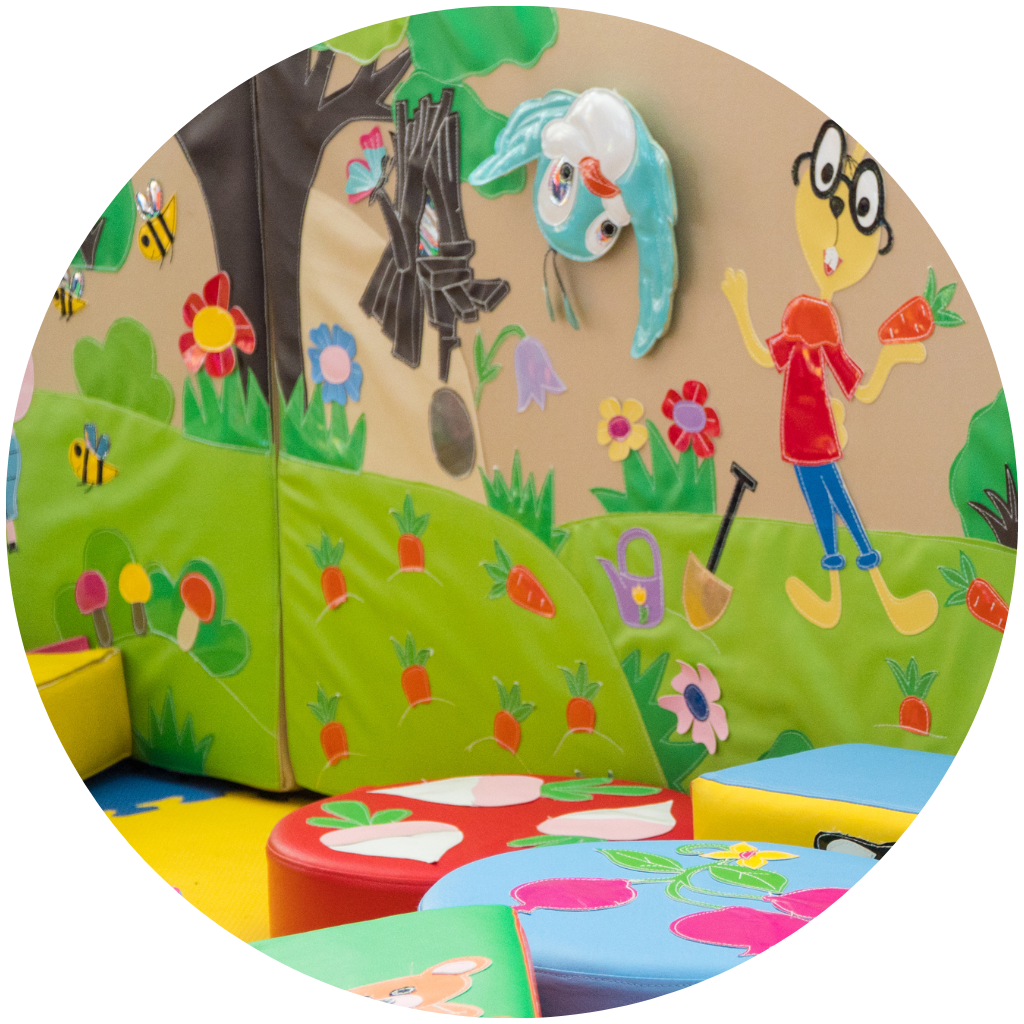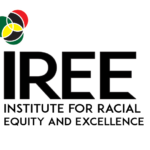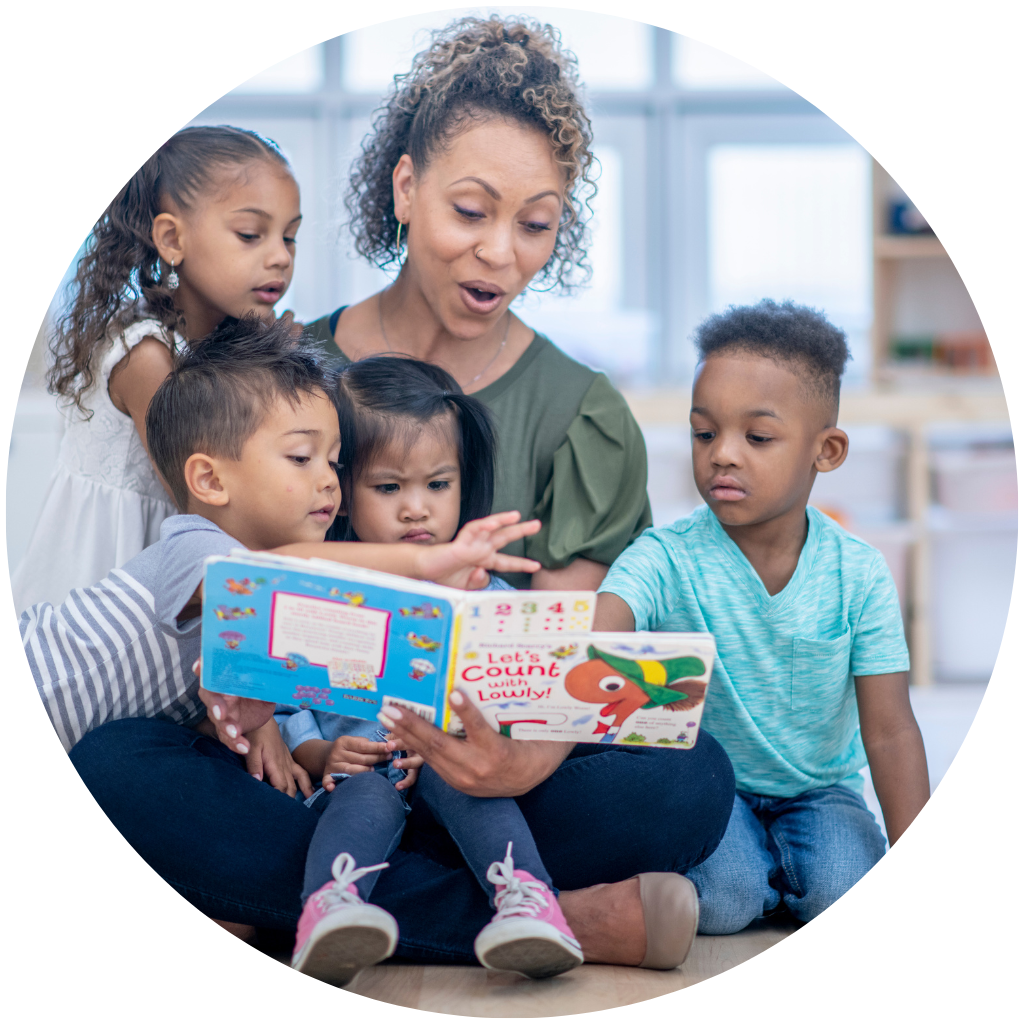Child Care as a Career
Providing child care is an exciting career move and benefits our community. The two types of child care below each have different requirements, and both provide you with the opportunity to have a positive impact on the health and development of children and help them to become caring, responsible, and successful adults. You will also offer parents the security of knowing their children are in good hands while enabling them to pursue work or school to become better providers for their family.
There are two types of licensed child care:
- Family Child Care Home
- Child Care Centers
The Foundations team looks forward to providing you with training, technical assistance, and ongoing support. Start your journey today!


Child care Centers
Opening a licensed child care center is an exciting career move that offers you the opportunity to provide appropriate care and guidance for other children in your community. The process takes time and planning is the key to success as you consider everything from policies and procedures to ordering supplies and setting up your child care environment.
Resources for getting started are below!
Family child Care
Becoming a licensed Family Child Care Provider is an exciting career move that offers you the opportunity to be at home with your own children, and to provide appropriate care and guidance for other children in your community. Licensed Family Child Care Providers can earn income for their families while providing an invaluable service to the community. The process takes time, and planning is the key to success as you consider everything from policies and procedures to ordering supplies and setting up your child care environment.
Resources for getting started are below!
check out the New video!
Below the video you will find information specific to opening a child care center or a family child care home, followed by additional licensing and business resources.
Opening a Child Care Center
What is child care licensing?
Child care licensing standards set the minimum acceptable health, safety, and program standards for the legal operation of child care programs. Licensed care, sometimes referred to as regulated care, is a baseline below which it is illegal to operate. It is not an indicator of quality care. More on quality programming can be found on our website. A few topics to consider are listed below as you begin your journey to open a child care center. For details on all of the topics, click here.
- Finding a Location for your Business
- Physical Space
- Health
- Fire Prevention & Safety
- Accessibility
Here are other resources, with additional business resources at the bottom of this page.
- Starting a Child Care Center Checklist
- Developing a Business Plan
- Required Background Checks
- Opening a Center (budgets, taxes, insurance, staffing, handbooks, etc.)
- Small Business Development Center Resource Guide
Zoning
For property within the city limits, contact Colorado Springs: 719-385-5905
For property outside the city limits, contact El Paso County: 719-520-6300
Additional Contact Information:
- City of Fountain: 719.322.2028
- Teller County: 719.687.3048
- Elbert County: 303.621.3135
Fire Department
Contact the local firehouse closest to the center location you are considering.
Health Department
The Colorado Department of Public Health and Environment establishes and enforces sanitary standards for child care facilities to protect the health of children and staff in these facilities. Inspections are required every two years but may be conducted more frequently based on an assessment of risk. In El Paso County, the local Department of Public Health inspects child care facilities.
Regulations:
- Rules and regulations governing health and sanitation in child care facilities (official Secretary of State version).
- Rules and regulations governing health and sanitation in child care facilities (reader-friendly).
- Summary of Changes.
The Division of Early Care and Learning is developing administrative guides to accompany rules regulating child care facilities. The guide serves to clarify and ensure the proper and consistent interpretation and implementation of child care rules. The guide also provides the rationale behind rules and links to resources to help programs comply with the rules.
Available Guides
- Administrative Guide: General Rules Regulating Child Care Facilities 7.701
- Administrative Guide: Rules Regulating Child Care Centers 7.702
Available Guides (Spanish)
- Guía Administrativa: Reglamento General para Guarderías Infantiles 7.701
- Guía Administrativa: Reglas para las Guarderías Infantiles 7.702
The Institute for Racial Equity & Excellence (IREE) is responsible for providing licensing services in Arapahoe, El Paso, and Pueblo counties. IREE uses the “Community Based Licensing” model created by President and CEO Dr. Rosemarie Allen.
Community Based Licensing© focuses on providing licensing services that are culturally responsive using four Cs: Competence, Caring, and Compassion while ensuring Compliance.
Visit the IREE Website
For more information, see the Licensing Resources section below.
JI is here to help students navigate the path toward advancing their education and professional development goals. Scholarship applications are currently closed.
WHAT IS CCCAP
The Colorado Child Care Assistance Program (CCCAP) provides financial assistance to help pay for high quality early care and learning on behalf of Colorado families within three human services programs: Low-Income CCCAP, Temporary Assistance to Needy Families (TANF) and Child Welfare (CWCC). For Low-income CCCAP, eligibility is based on family income and activity (working, adult education, higher education, job search). For TANF and CWCC, CCCAP is a supportive service based on a referral from that program to CCCAP. These families need child care in order to continue their employment, higher education, job search, and their move toward self-sufficiency. As a child care provider, you will be working in partnership with counties to assist these families’ experiences with high quality early care and learning.
WHY ACCEPT CCCAP?
In our county, 25% of the 459 child care programs accept children and families who receive the CCCAP subsidy. Of those programs, only 50 are considered high-quality early childhood settings. This means that families needing this assistance only have 11% of the options of those not needing this help, and only half of the centers that do offer CCCAP are considered high-quality early childhood settings. Accepting CCCAP in your center creates a community in which each and every child is given the opportunity for a strong start.
Are you operating an existing new early childhood program, a newly opened program, or are you in the process of considering opening a new program and want to serve CCCAP children and families? Are you a program with a new CCCAP Fiscal Agreement? If so, see below to learn about how AFK, in partnership with the El Paso County Department of Human Services, can support programs that qualify
- Technical assistance in opening a new early childhood center or Family Child Care Home
- Scholarships for Pre-Licensing and the Early Childhood Administrative Summit
- Start-Up funds
- Coaching to get your program started off in the right direction
- Incentive funds for gaining a CCCAP Fiscal Agreement
- Incentive funds for getting a high quality rating (Level 3, 4, or 5)
HOW TO BECOME A CCCAP PROVIDER
The Colorado Department of Early Childhood offers guidance for early childhood centers and family child care homes that are wanting to accept CCCAP.
- CCCAP Handbook for Providers October 2022 (English)
- CCCAP Handbook for Providers October 2022 (Spanish)
The county will send you a packet of information detailing the necessary documents and training including:
- A Fiscal Agreement, or the contract between you and the county, which outlines each party’s responsibilities, policies and the rate you will be reimbursed for child care services. You will need a Fiscal Agreement with each county that you will accept children from under the CCCAP program.
- A Form W-9 (IRS) used for identification purposes to report payments made by CCCAP. You will receive a 1099 Form (IRS) at the end of each calendar year for tax purposes.
Contact your county department of human/social services for information.
CCCAP SUPPORT SESSIONS
The State CCCAP Team is offering monthly support sessions for early childhood providers on the 4th Wednesday of the month from 12–12:45 pm. Sessions include CCCAP updates, Attendance Tracking System overview and demonstration, and time for Q+A.
Join the sessions via Google Meet HERE or dial 561.614.0668 (PIN: 240 371 957#)
REIMBURSEMENT RATES
- Reimbursement rates are subject to change yearly based on the annual Market Rate Survey.
- For current El Paso County CCCAP information, this information is on the Colorado Department of Early Childhood website HERE.
ATTENDANCE TRACKING
We are thrilled to announce the release of updated Attendance Tracking System (ATS) training videos for both parents and providers! The previous ATS videos were created about 5 years ago and needed to be updated to include newer functionality in ATS. The new ATS Videos are housed on the Colorado Department of Early Childhood YouTube Channel. They can be found HERE. The videos are available in both English and Spanish.
- ATS Information and Resources
- Call the ATS Help Desk at 844.447.4441 or email cdhs_ats_helpdesk@state.co.us
- El Paso County Department of Human Services (719) 636-0000
For complete details on becoming a UPK provider, visit our UPK page HERE.
Opening a Family Child CAre
As you begin the journey of opening a Family Child Care Home, there are many things to consider and you may wish to seek legal advice before you decide to use your own home for child care, purchase property or sign a lease agreement. These documents below provide things to consider:
- Do I Need a License? English Flyer | Spanish Flyer
- Are you Ready to Start a Child Care Business?
- Questions to Consider for Meeting Licensing Requirements
- Family Child Care Home License Submission Guide
- Small Business Development Center Resource Guide
Contact Zoning: Call the Zoning office to assure that your residence is zoned to operate a Family Child Care Home. This step is crucial as Zoning supersedes Licensing.
For zoning within the city limits, call Colorado Springs: 719-385-5905
City Administration Building
30 S. Nevada Ave., Suite 105
- City of Colorado Springs Small and Large Home Daycare Permit
- Download and Print Zoning Permit Application HERE
For zoning outside the city limits, call El Paso County: 719-520-6300
Additional Contact Information:
- City of Fountain: 719.322.2028
- Teller County: 719.687.3048
- Elbert County: 303.621.3135
Once you have complied with all local zoning, building or planning ordinances, and any Home Owner Association or Community Covenants, the next step is reading the Child Care Rules and Regulations. These are provided below and available on the Department of Early Childhood website in English and Spanish.
Rules + Regulations:
- 2.100 – General Rules for Child Care Facilities
2.200- Rules Regulating Child Care Centers
2.300 – Rules Regulating Family Child Care Homes
It’s important to know that as a child care provider, you must meet new and ongoing training requirements. The Office of Early Childhood (OEC) has developed a 2022 licensed child care provider required training tool. The CDEC is working hard to offer all required training for free online through the Professional Development Information System (PDIS).
Administrative Guides:
- Administrative Guide: General Rules Regulating Child Care Facilities(opens in new window)
- (Guia administrativa para el reglamento general del cuidado infantil)
- Administrative Guide: Rules Regulating Child Care Centers(opens in new window)
- Administrative Guide: Rules Regulating Family Child Care Homes(opens in new window)
Foundations staff are here to assist you with PDIS when you reach this point. Visit the Quality Programs page for more information. See the next box for Pre-Licensing training and applying for your Child Care License.
JI offers a quarterly course for becoming a licensed provider. Cost is $50.
- Where to start and what is important to consider when exploring the possibility of opening a family child care home – call us first if your considering enrolling in the Pre-Licensing classes!
- Assistance with zoning and HOA needs
- Support with completing the licensing application
- Technical assistance and on-site support for setting up your learning environment.
The licensing process takes approximately 90 days once an application packet is received by the Division of Early Care and Learning (DECL). For information on how to apply for a Child Care License click HERE. The licensing process includes the following steps:
- Complete and sign the Family Child Care Home Application and all necessary attachments. Detailed instructions are included in the Licensing Application Packet. The licensing application and rules and regulations can also be downloaded from the State site:
- Complete and mail your application materials. The application form and the fees must be submitted together in the envelope provided with your application packet to the Division of Early Care and Learning, CDHS.
- Licensing Fee Schedule
- For complete background check information, click here.
- Due to changes implemented by the Colorado Bureau of Investigation (CBI), the Colorado Springs Police Department (CSPD) will no longer offer non-criminal fingerprint services to the general public. All fingerprinting will be processed through two vendors, IdentoGO and Colorado Fingerprinting.
Update:
You will want to read important instructions HERE before navigating the IdentoGO site. For locations, hours and directions, visit this direct link on the IdentoGO.com website. For IdentoGO FAQs, click here. - Current health evaluations must be done for ALL those living in the home and must be signed by a licensed physician or licensed nurse practitioner. These forms are included in your licensing packet. The health forms are NOT mailed into the state.
Mail to:
Application Processing
Division of Early Care and Learning, CDHS
1575 Sherman Street, 1st Floor
Denver, CO 80203-1714
- Once the licensing package is received and processed, a Licensing Specialist will contact the applicant to schedule an inspection of the home to verify compliance with licensing rules and regulations, and to determine if a license should be issued.
- Make the necessary preparations
- Start-up preparations will vary from one individual to another. Allow yourself plenty of time for planning, creating your policies and procedures, contracts, gathering supplies, and setting up your child care environment before your home visit is scheduled with the Colorado State Division of Child Care Licensing Specialist.
The Institute for Racial Equity & Excellence (IREE) is responsible for providing licensing services in Arapahoe, El Paso, and Pueblo counties. IREE uses the “Community Based Licensing” model created by President and CEO Dr. Rosemarie Allen.
Community Based Licensing© focuses on providing licensing services that are culturally responsive using four Cs: Competence, Caring, and Compassion while ensuring Compliance.
Visit the IREE Website
For more information, see Licensing Resources section below.
JI may offer a scholarship for each upcoming session of the Pre-Licensing class required to become a licensed child care provider.
- Substitutes for Infant/Toddler Family Child Care Homes and Large Family Child Care homes must be equally qualified (same qualifications as the primary provider).
Per the 7.707.31 B clarification, – only Infant Toddler Home Substitutes are required to have taken EQIT: Equally qualified means that the provider, employee, or substitute provide has the same required training and qualifications as the primary provider as specified in Family Child Care rules. Each provider must have completed Expanding Quality for Infants & Toddlers training (EQIT).
WHAT IS CCCAP
The Colorado Child Care Assistance Program (CCCAP) provides financial assistance to help pay for high quality early care and learning on behalf of Colorado families within three human services programs: Low-Income CCCAP, Temporary Assistance to Needy Families (TANF) and Child Welfare (CWCC). For Low-income CCCAP, eligibility is based on family income and activity (working, adult education, higher education, job search). For TANF and CWCC, CCCAP is a supportive service based on a referral from that program to CCCAP. These families need child care in order to continue their employment, higher education, job search, and their move toward self-sufficiency. As a child care provider, you will be working in partnership with counties to assist these families’ experiences with high quality early care and learning.
WHY ACCEPT CCCAP?
In our county, 25% of the 459 child care programs accept children and families who receive the CCCAP subsidy. Of those programs, only 50 are considered high quality early childhood settings. This means that families needing this assistance only have 11% of the options of those not needing this help and only half of the centers that do offer CCCAP are considered high quality early childhood settings. Accepting CCCAP in your center creates a community in which each and every child is given the opportunity for a strong start.
Are you operating an existing new early childhood program, a newly opened program, or are you in the process of considering opening a new program and want to serve CCCAP children and families? Are you a program with a new CCCAP Fiscal Agreement? If so, see below to learn about how AFK , in partnership with the El Paso County Department of Human Services, can support programs that qualify
- Technical assistance in opening a new early childhood center or Family Child Care Home
- Scholarships for Pre-Licensing and the Early Childhood Administrative Summit
- Start Up funds
- Coaching to get your program started off in the right direction
- Incentive funds for gaining a CCCAP Fiscal Agreement
- Incentive funds for getting a high quality rating (Level 3, 4, or 5)
- Reach out to Shay Almonte to learn more today
HOW TO BECOME A CCCAP PROVIDER
The Colorado Department of Early Childhood offers guidance for early childhood centers and family child care homes that are wanting to accept CCCAP.
The county will send you a packet of information detailing the necessary documents and training including:
- A Fiscal Agreement, or the contract between you and the county, which outlines each party’s responsibilities, policies and the rate you will be reimbursed for child care services. You will need a Fiscal Agreement with each county that you will accept children from under the CCCAP program.
- A Form W-9 (IRS) used for identification purposes to report payments made by CCCAP. You will receive a 1099 Form (IRS) at the end of each calendar year for tax purposes.
Contact your county department of human/social services for information.
CCCAP SUPPORT SESSIONS
The State CCCAP Team is offering monthly support sessions for early childhood providers on the 4th Wednesday of the month from 12–12:45 pm. Sessions include CCCAP updates, Attendance Tracking System overview and demonstration, and time for Q+A.
Join the sessions via Google Meet HERE or dial 561.614.0668 (PIN: 240 371 957#)
REIMBURSEMENT RATES
- Reimbursement rates are subject to change yearly based on the annual Market Rate Survey.
- For current El Paso County CCCAP information, this information is on the Colorado Department of Early Childhood website HERE.
ATTENDANCE TRACKING
We are thrilled to announce the release of updated Attendance Tracking System (ATS) training videos for both parents and providers! The previous ATS videos were created about 5 years ago and needed to be updated to include newer functionality in ATS. The new ATS Videos are housed on the Colorado Department of Early Childhood YouTube Channel. They can be found HERE. The videos are available in both English and Spanish.
- ATS Information and Resources
- Call the ATS Help Desk at 844.447.4441 or email cdhs_ats_helpdesk@state.co.us
- El Paso County Department of Human Services (719) 636-0000
For complete details on becoming a UPK provider, visit our UPK page HERE.
Licensing Resources
Licensing | IREE
In El Paso County, licensing questions may be directed to your assigned licensing specialist (see caseload list below) or to the following for general questions:
Kristen Boss
Executive Director of Licensing
Kristen@IREEinc.com
720.419.7381
Institute for Racial Equity & Excellence (IREE)
Visit the IREE website HERE.
For case load assignments by ZIP code, click HERE.
Resources for Child Care Programs:
- Click here to access the folder containing forms and checklists for licensed child care programs.
- Seleccione aquí para tener acceso a los formularios y las listas de requisitos para programas de cuidado infantil bajo licencia.

Child Abuse and Neglect Checks (Trails checks)
The Office of Early Childhood (OEC) Background Investigations Unit (BIU) is now able to complete Child Abuse and Neglect Checks (Trails checks) for persons responsible for supervising children and who have unsupervised contact with children. This change went into effect August 2, 2019. If you have any questions about these changes, please contact the Background Investigations Unit at 303.866.2266 or by email.
Portability of Background Checks for Child Care Workers
House Bill 17-1135 made Trails background checks portable between child care or preschool locations operated by the same governing body, similar to Colorado Bureau of Investigation (CBI) checks. View the full legislation HERE.
Accessibility of Exempt Family Child Care
Senate Bill 17-110 increased the number of unrelated children a home-based caregiver can watch without obtaining a child care license from the Colorado Department of Human Services, Office of Early Childhood. The change allows a home-based child care provider to care for four (4) or fewer children ages birth to 18 years old, and no more than two (2) of the children are under the age of two (2) years old. The children are not required to be related to each other or to the caregiver. If the provider is caring for their own children, their children are included in the four (4) children limit. Learn more about the new statutes HERE.
Child Care Licensing Rules | September 2019
The Office of Early Childhood recently updated the Administrative Guides for Rules Regulating Child Care Facilities. The available guides include:
- General Rules Regulating Child Care Facilities 7.701
- Rules Regulating Child Care Centers 7.702
- Rules Regulating Family Child Care Homes 7.707
- Rules Regulating Children’s Resident Camps 7.711 **NEW**
- Rules Regulating School-Aged Child Care Centers 7.712 **NEW**
These guides serve to clarify and ensure the proper, and consistent, interpretation and implementation of child care rules. They also provide the rationale behind the rules as well as resources to help programs comply.
Any questions about the guides or the rules may be directed to your licensing specialist.
The Department of Early Childhood website is available in English and Spanish.
Please contact your licensing specialist for assistance, or call the Division of Early Care and Learning at 1-800-799-5876 if you have any questions.
Business Resources
The Colorado Department of Early Childhood is excited to share the updated versions of the Business Guides For Early Care And Education Providers. Detailed information about the Business Guides is available on our Early Childhood Workforce page.
- Business Guide for Family Child Care Homes (en español)
- Business Guide for Child Care Centers (en español)
The availability of programs and benefits changes rapidly. Check the individual sites below for details and updates.
